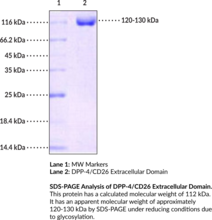Territorial Availability: Available through Bertin Technologies only in France
- Correlated keywords
- DPP4 IV CD 26 extra-cellular HEK 293 GLP1 MERSCoV anti-hypertensive ADCP 2 TP 103
- Product Overview:
Dipeptidyl peptidase 4 (DPP-4), also known as CD26, is a type II transmembrane glycoprotein with a major role in glucose metabolism.{54903} It is composed of a short cytoplasmic tail, a transmembrane domain, and a large extracellular domain, which contains a flexible stalk, glycosylation- and cysteine-rich regions, and a catalytic region. DPP-4 is expressed in endothelial and epithelial tissues, as well as T cells, activated B cells, activated natural killer (NK) cells, and myeloid cells. It functions as a homodimer that cleaves X-proline dipeptides from the N-terminus of various polypeptide substrates, such as GLP-1, to regulate glucose metabolism, immune responses, nociception, and blood pressure.{54903,54904,54905} Additionally, DPP-4 acts as a co-stimulator of T cell receptor-mediated T cell activation and functional receptor for Middle East respiratory syndrome coronavirus (MERS-CoV).{54903,54906} Small molecule-induced inhibition of DPP-4 improves glucose tolerance in animal models of insulin resistance and has antihypertensive effects in various rodent models of hypertension.{54904,54905} Cayman’s DPP-4/CD26 Extracellular Domain (human, recombinant) protein can be used for binding assays. This protein is a disulfide-linked homodimer. The reduced monomer, composed of DPP-4 (amino acids 29-766) fused to His-tagged human IgG1 Fc at its N-terminus, consists of 975 amino acids and has a calculated molecular weight of 112 kDa. As a result of glycosylation, the monomer migrates at approximately 120-130 kDa by SDS-PAGE under reducing conditions.
Cayman Chemical’s mission is to help make research possible by supplying scientists worldwide with the basic research tools necessary for advancing human and animal health. Our utmost commitment to healthcare researchers is to offer the highest quality products with an affordable pricing policy.
Our scientists are experts in the synthesis, purification, and characterization of biochemicals ranging from small drug-like heterocycles to complex biolipids, fatty acids, and many others. We are also highly skilled in all aspects of assay and antibody development, protein expression, crystallization, and structure determination.
Over the past thirty years, Cayman developed a deep knowledge base in lipid biochemistry, including research involving the arachidonic acid cascade, inositol phosphates, and cannabinoids. This knowledge enabled the production of reagents of exceptional quality for cancer, oxidative injury, epigenetics, neuroscience, inflammation, metabolism, and many additional lines of research.
Our organic and analytical chemists specialize in the rapid development of manufacturing processes and analytical methods to carry out clinical and commercial GMP-API production. Pre-clinical drug discovery efforts are currently underway in the areas of bone restoration and repair, muscular dystrophy, oncology, and inflammation. A separate group of Ph.D.-level scientists are dedicated to offering Hit-to-Lead Discovery and Profiling Services for epigenetic targets. Our knowledgeable chemists can be contracted to perform complete sample analysis for analytes measured by the majority of our assays. We also offer a wide range of analytical services using LC-MS/MS, HPLC, GC, and many other techniques.
Accreditations
ISO/IEC 17025:2005
ISO Guide 34:2009
Cayman is a leader in the field of emerging drugs of abuse, providing high-purity Schedule I-V Controlled Substances to federally-licensed laboratories and qualified academic research institutions for forensic analyses. We are certified by ACLASS Accreditation Services with dual accreditation to ISO/IEC 17025:2005 and ISO Guide 34:2009.





